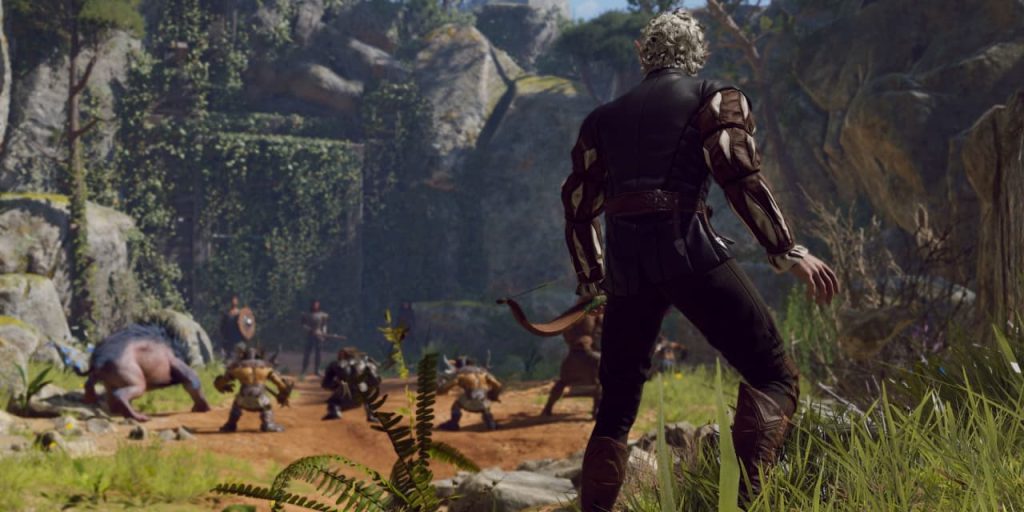Videogame players have rushed to join the imaginary world that exists inside Baldur’s Gate 3, but the likely financial impact of the game on
Hasbro
is no fantasy at all.
Baldur’s Gate 3, the videogame version of Dungeons & Dragons, has taken both the gaming world and social media by storm since it was released on Aug. 3. The videogame was created by developer Larian Studios, but Hasbro stands to gain nonetheless because its Wizards of the Coast unit owns the widely popular tabletop version of the role-playing game.
In the traditional version of D&D, participants sit around a table, pretending to be characters such as wizards and fighters who are traveling through an imaginary world. They use dice to determine what happens when they fire a lightning bolt at a dragon, or refuse to pay for lodging at an imaginary inn.
Players of the videogame no longer have to sit around a table with printed-out character sheets, maps, and metal figurines. Fans can play Baldur’s Gate, set in an imaginary world called the Forgotten Realms of Dungeons & Dragons, either solo or with a group of up to three other players. Like players of the original game, they fight magical monsters, create relationships with characters, cast spells, and much more.
The pop-culture buzz around the game is significant, given that the hashtag #baldursgate3 has amassed 1.7 billion views on TikTok. And that popularity is bringing a new audience of people to the D&D world, which is an important step following the release of the D&D film earlier this year and as the company heads into the 50th anniversary of the role-playing game in 2024, James Zahn, editor in chief at the trade magazine The Toy Book, said in an interview with Barron’s Tuesday.
The more people that gain exposure to D&D through Baldur’s Gate 3, the more revenue the company can expect as fans turn to playing the tabletop game, or buying branded merchandise, he said.
Hasbro is also benefiting more directly from the game. Larian Studios created Baldur’s Gate under license from Hasbro’s Wizards of the Coast unit, which owns D&D and the card game Magic the Gathering.
Wizards of the Coast hasn’t released the specifics of its licensing agreement with Larian, and the company didn’t immediately respond to a request for comment about the arrangement. But expectations are high for the amount of money Baldur’s Gate 3 could bring into Hasbro.
Analysts surveyed by FactSet expect the company to report third-quarter Wizards of the Coast and Digital gaming revenue of $390 million on Oct. 26, which is a jump from the same period last year’s $304 million. Franchise brand sales for the quarter are expected to be $1.02 billion, up from last year’s $814 million.
“We will likely make more money on Baldur’s Gate 3 than we have made on all of our film licensing for the last five to 10 years, combined,” Hasbro Chief Executive officer Chris Cocks said on the company’s second-quarter earnings call in August. That includes movies like Dungeons & Dragons: Honor Among Thieves, as well as recent Transformers and G.I. Joe films.
Jefferies analyst Andrew Uerkwitz wrote in a research note Tuesday that he expects management to offer more detail on the outlook for videogame-related revenue when it discloses the third-quarter results. He said he is “positively biased for management commentary regarding the WOTC [Wizards of the Coast] segment.”
Hasbro could use the good news. Analysts expect the company to post third-quarter revenue of $1.657 billion, which would be down from $1.676 billion a year earlier.
“They are refocusing on their core product lines—the toys and games—looking into their licensing, and really looking for new ways to reconnect with consumers coming off of the pandemic-fueled sales boom that the greater industry also benefited from, and essentially a terrible holiday season last year across the board where there were inventory jam ups,” Zahn said.
Baldur’s Gate 3 is no magic missile but it is helping to change the game for Hasbro.
Write to Angela Palumbo at angela.palumbo@dowjones.com
Read the full article here
